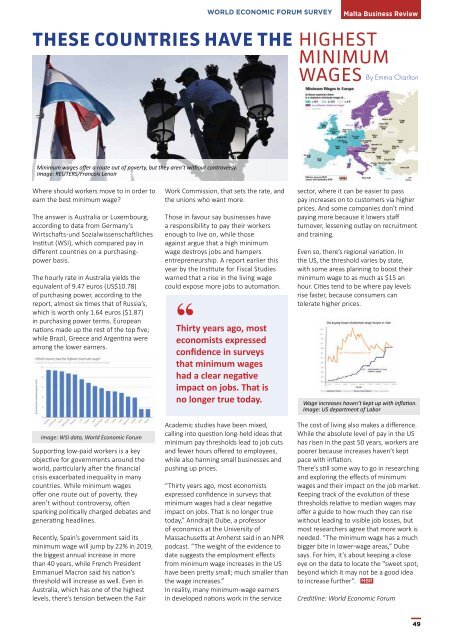MBR_ISSUE 49_MARCH_lowres
You also want an ePaper? Increase the reach of your titles
YUMPU automatically turns print PDFs into web optimized ePapers that Google loves.
WORLD ECONOMIC FORUM SURVEY<br />
THESE COUNTRIES HAVE THE<br />
Malta Business Review<br />
HIGHEST<br />
MINIMUM<br />
WAGES<br />
By Emma Charlton<br />
Minimum wages offer a route out of poverty, but they aren’t without controversy.<br />
Image: REUTERS/Francois Lenoir<br />
Where should workers move to in order to<br />
earn the best minimum wage?<br />
The answer is Australia or Luxembourg,<br />
according to data from Germany’s<br />
Wirtschafts-und Sozialwissenschaftliches<br />
Institut (WSI), which compared pay in<br />
different countries on a purchasingpower<br />
basis.<br />
The hourly rate in Australia yields the<br />
equivalent of 9.47 euros (US$10.78)<br />
of purchasing power, according to the<br />
report, almost six times that of Russia’s,<br />
which is worth only 1.64 euros ($1.87)<br />
in purchasing power terms. European<br />
nations made up the rest of the top five;<br />
while Brazil, Greece and Argentina were<br />
among the lower earners.<br />
Image: WSI data, World Economic Forum<br />
Supporting low-paid workers is a key<br />
objective for governments around the<br />
world, particularly after the financial<br />
crisis exacerbated inequality in many<br />
countries. While minimum wages<br />
offer one route out of poverty, they<br />
aren’t without controversy, often<br />
sparking politically charged debates and<br />
generating headlines.<br />
Recently, Spain’s government said its<br />
minimum wage will jump by 22% in 2019,<br />
the biggest annual increase in more<br />
than 40 years, while French President<br />
Emmanuel Macron said his nation’s<br />
threshold will increase as well. Even in<br />
Australia, which has one of the highest<br />
levels, there’s tension between the Fair<br />
Work Commission, that sets the rate, and<br />
the unions who want more.<br />
Those in favour say businesses have<br />
a responsibility to pay their workers<br />
enough to live on, while those<br />
against argue that a high minimum<br />
wage destroys jobs and hampers<br />
entrepreneurship. A report earlier this<br />
year by the Institute for Fiscal Studies<br />
warned that a rise in the living wage<br />
could expose more jobs to automation.<br />
"Thirty years ago, most<br />
economists expressed<br />
confidence in surveys<br />
that minimum wages<br />
had a clear negative<br />
impact on jobs. That is<br />
no longer true today.<br />
Academic studies have been mixed,<br />
calling into question long-held ideas that<br />
minimum pay thresholds lead to job cuts<br />
and fewer hours offered to employees,<br />
while also harming small businesses and<br />
pushing up prices.<br />
“Thirty years ago, most economists<br />
expressed confidence in surveys that<br />
minimum wages had a clear negative<br />
impact on jobs. That is no longer true<br />
today,” Arindrajit Dube, a professor<br />
of economics at the University of<br />
Massachusetts at Amherst said in an NPR<br />
podcast. “The weight of the evidence to<br />
date suggests the employment effects<br />
from minimum wage increases in the US<br />
have been pretty small; much smaller than<br />
the wage increases.”<br />
In reality, many minimum-wage earners<br />
in developed nations work in the service<br />
sector, where it can be easier to pass<br />
pay increases on to customers via higher<br />
prices. And some companies don’t mind<br />
paying more because it lowers staff<br />
turnover, lessening outlay on recruitment<br />
and training.<br />
Even so, there’s regional variation. In<br />
the US, the threshold varies by state,<br />
with some areas planning to boost their<br />
minimum wage to as much as $15 an<br />
hour. Cities tend to be where pay levels<br />
rise faster, because consumers can<br />
tolerate higher prices.<br />
Wage increases haven’t kept up with inflation.<br />
Image: US department of Labor<br />
The cost of living also makes a difference.<br />
While the absolute level of pay in the US<br />
has risen in the past 50 years, workers are<br />
poorer because increases haven’t kept<br />
pace with inflation.<br />
There’s still some way to go in researching<br />
and exploring the effects of minimum<br />
wages and their impact on the job market.<br />
Keeping track of the evolution of these<br />
thresholds relative to median wages may<br />
offer a guide to how much they can rise<br />
without leading to visible job losses, but<br />
most researchers agree that more work is<br />
needed. “The minimum wage has a much<br />
bigger bite in lower-wage areas,” Dube<br />
says. For him, it’s about keeping a close<br />
eye on the data to locate the "sweet spot,<br />
beyond which it may not be a good idea<br />
to increase further”. <strong>MBR</strong><br />
Creditline: World Economic Forum<br />
www.maltabusinessreview.net<br />
<strong>49</strong>
















